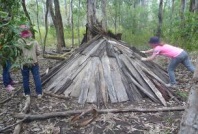 This
program provides opportunities for students to investigate the lifestyle of the
traditional Indigenous groups who inhabited the area around Barambah. A
discussion about the local area from the vantage point of One Tree Hill and an
examination of Indigenous artefacts provide students with an understanding of
how the land was used by the traditional people.
This
program provides opportunities for students to investigate the lifestyle of the
traditional Indigenous groups who inhabited the area around Barambah. A
discussion about the local area from the vantage point of One Tree Hill and an
examination of Indigenous artefacts provide students with an understanding of
how the land was used by the traditional people.
Students are able to gain a deep
understanding of how Indigenous people lived through participating in a group
challenge. Students are allocated to a
group at the start of camp and complete four hands-on activities which allow
them to earn health credits for the group.
These activities include using traditional tools and weapons, fire
making, identifying and sampling of bush foods, building shelters from
traditional materials and making string using traditional methods. Health
credits are represented by beads on a group necklace, and the health of the
group as a whole is represented by having multiple beads for each of the
activities. At the end of camp students
are able to compare how successfully they have lived as a group by comparing
their necklaces or health credits.
Australian Curriculum links
History
Year 3
The
importance of Country and Place to Aboriginal and/or Torres Strait Islander
peoples who belong to a local area. (ACHASSK062).
Year 4
The diversity of Australia's first peoples and the long and continuous connection of Aboriginal and Torres Strait Islander Peoples to Country/Place (land, sea, waterways and skies) (ACHASSK083).
Year 6
The contribution of individuals and groups to the development of Australian society since federation (ACHASSK137).
Geography
Year 3
The representation of Australia as state and territories and as Countries/Places of Aboriginal and Torres Strait Islander Peoples; and major places both natural and human (ACHASSK066).
Year 4
The custodial responsibility Aboriginal and or Torres Strait Islander Peoples have for Country/Place, and how this influences views about sustainability (ACHASSK089).
Year 5
The influence of people, including Aboriginal and Torres Strait Islander Peoples, on the environmental characteristics of Australian places (ACHASSK112).
Aboriginal and Torres Strait Islander histories and cultures
OI. 2:
Aboriginal and Torres Strait Islander communities maintain a special connection
to and responsibility for Country/Place throughout all of Australia.
OI. 3:
Aboriginal and Torres Strait Islander Peoples have unique belief systems and
are spiritually connected to the land, sea, sky and waterways.
OI. 5:
Aboriginal and Torres Strait Islander Peoples’ ways of life are uniquely
expressed through ways of being, knowing, thinking and doing.
Sustainability
Years 3 - 10
OI. 9: Sustainable futures
result from actions designed to preserve and/or restore the quality and
uniqueness of environments.
Years 7 -10
01.7 The broader Aboriginal and Torres Strait Islander societies encompass a diversity of nations across Australia.
Critical and creative thinking
Years 3 and 4
Reflect on, explain and check the processes used to come to conclusions.
Years 5 and 6
Pose questions to clarify and interpret information and probe for causes and consequences.
Years 7 and 8
Assess assumptions in their thinking and invite alternative opinions.
Years 9 and 10
Give reasons to support their thinking and address opposing viewpoints and possible weaknesses in their opinions.